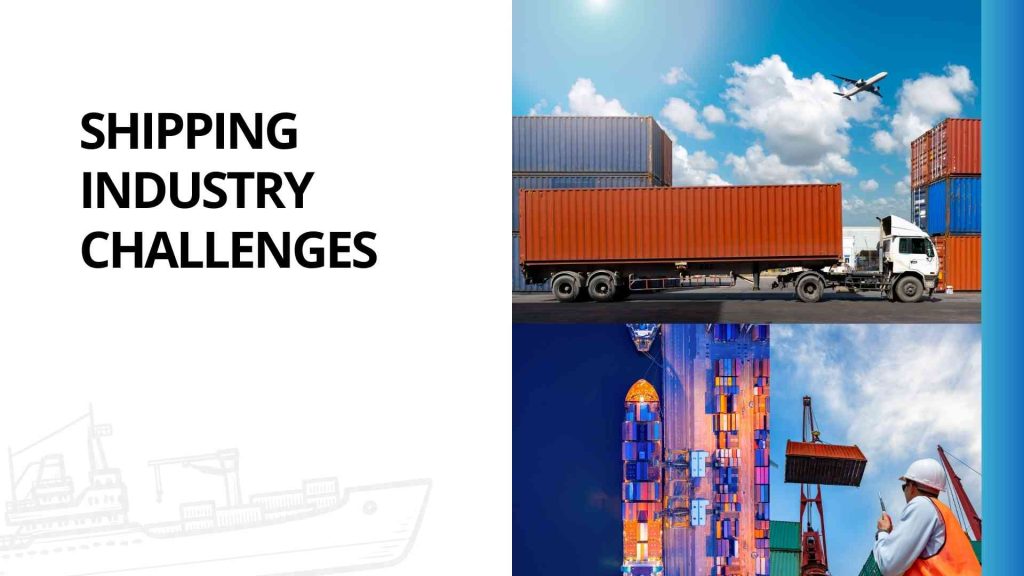The global shipping industry is the backbone of international trade, transporting over 80% of the world’s goods. The shipping industry is pivotal in ensuring products reach their destinations efficiently and cost-effectively. Shipping companies play an essential role in global commerce by facilitating the transportation of goods and commodities across the world’s oceans and waterways. These businesses can vary widely in size, specialization, and services offered. However, this essential sector has its share of technical challenges. We will explore some of the primary technical hurdles that the shipping Industry encounters during the transit of goods and how they strive to overcome them.
Navigational Challenges
One of the most critical aspects of shipping is navigation. Vessels must traverse vast oceans and seas, dealing with unpredictable weather conditions, challenging waterways, and the constant threat of collisions with other ships or natural obstacles like icebergs. Modern shipping companies rely on advanced navigation systems such as GPS, radar, and sonar to ensure safe and efficient routes. These systems enable real-time tracking, route optimization, and collision avoidance, but they also require regular maintenance and updates to stay effective.
Communication and Data Connectivity
Effective communication is paramount in shipping. Vessels must constantly contact onshore teams, port authorities, and other ships for safety and operational reasons. Maintaining reliable data connectivity in the middle of the ocean can be a formidable challenge. Shipping companies often rely on satellite communication systems, which are expensive and prone to disruptions due to weather conditions or technical issues. Innovations in satellite technology and the advent of low Earth orbit (LEO) satellite constellations promise to improve connectivity, but they also require significant investments.
Fuel Efficiency and Environmental Concerns
Environmental regulations are becoming increasingly stringent, requiring the shipping industry to reduce its carbon footprint. Traditional marine fuels are highly polluting, and the industry is under pressure to transition to cleaner alternatives like liquefied natural gas (LNG) or explore innovative propulsion technologies, such as wind-assisted propulsion and electric engines. These technical upgrades come with challenges, from retrofitting existing vessels to developing new fuel supply and storage infrastructure.
Cargo Tracking and Security
Protecting cargo security during transit is a top priority for the shipping Industry. Theft, tampering, and damage to goods can result in significant financial losses. Advanced tracking systems, including IoT (Internet of Things) devices and blockchain technology, are being employed to monitor cargo conditions, track its location, and maintain a digital record of its journey. However, these systems must be robust enough to withstand cyber threats and maintain data integrity.
Port Automation and Congestion
Ports are crucial hubs in the shipping industry, but many are plagued by congestion and inefficient operations. Technical challenges in port automation include integrating various systems to streamline cargo handling, improving container tracking, and optimizing vessel berthing processes. Additionally, adopting autonomous shipping technologies, such as automated mooring and unloading, brings both opportunities and challenges regarding safety and reliability.
Cybersecurity
As shipping becomes more digitized and reliant on technology, it becomes vulnerable to cyberattacks. Hackers can target navigation systems, communication networks, and cargo tracking systems. The shipping industry must invest in robust cybersecurity measures, including firewalls, intrusion detection systems, and employee training to safeguard operations.
The technical challenges shipping companies face during transit are diverse and ever-evolving. In an industry essential to global trade, overcoming these hurdles is essential for maintaining operational efficiency, ensuring cargo safety, and meeting environmental regulations. Through continued innovation, investment in technology, and collaboration with experts in various fields, the shipping industry can successfully navigate these challenges and continue serving as the lifeblood of international commerce.
How can Acumatica Help?
Acumatica cloud ERP can significantly enhance the shipping Industry’s business operations by providing a comprehensive and integrated platform that streamlines critical processes. From automating order management and optimizing route planning to real-time shipment tracking and inventory management, Acumatica offers a unified solution that improves operational efficiency and reduces costs.
Its robust financial management capabilities help shipping companies manage expenses, track revenue, and ensure compliance with financial regulations. Acumatica’s cloud-based architecture also facilitates remote access, fostering collaboration among teams regardless of location and allowing for easy scalability as the business grows. Overall, Acumatica ERP empowers the shipping Industry with the tools to achieve greater visibility, control, and profitability in their operations. Are you in the shipping business? Contact us for a customized ERP.

Vijay comes with a vast experience in ERP and enterprise solutions space with about 20 years of experience in various packaged application like Acumatica, SAP, Orion, Salesforce.com, SugarCRM and, SalesLogix.

